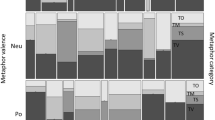Abstract
This study investigated whether and how different types of temporal metaphors in the lexicon and individual reading habits influence native Chinese speakers’ conceptualizations of time. The results indicate that the Cantonese- and Mandarin-speaking participants constructed time expressions differently to some extent. Both groups responded faster on the transverse axis than on the vertical one, which was in accordance with the reading habits produced by the major writing/printing directions in both Mandarin and Cantonese. However, the Cantonese participants made judgments significantly faster than the Mandarin participants did in non-canonical conditions on the vertical axis. This finding, though surprising, is in line with a finding of our linguistic survey that Cantonese speakers use linguistic terms on the vertical axis to express time concepts much more often than Mandarin speakers do. This suggests that, even in the case of Chinese languages, speakers’ space and time associations can to some extend be influenced by the use of different temporal metaphors in their lexicon.
Access this chapter
Tax calculation will be finalised at checkout
Purchases are for personal use only
Similar content being viewed by others
References
Boroditsky, L.: Does language shape thought? English and Mandarin speakers’ conceptions of time. Cogn. Psychol. 43(1), 1–22 (2001)
Boroditsky, L., Fuhrman, O., McCormick, K.: Do English and Mandarin speakers think about time differently? Cognition 118, 123–129 (2010)
Lai, V.T., Boroditsky, L.: The immediate and chronic influence of spatio-temporal metaphors on the mental representations of time in English, Mandarin, and Mandarin-English speakers. Front. Psychol. 4, 142–151 (2013)
Fuhrman, O., et al.: How linguistic and cultural forces shape conceptions of time: English and Mandarin time in 3D. Cogn. Sci. 35, 1305–1328 (2011)
Liu, L., Zhang, J.: A study about the psychological mechanism of space-time metaphor. Exploration of Psychology, pp. 332–336 (2009)
Chen, J.Y.: Do Chinese and English speakers think about time differently? failure of replicating Boroditsky (2001). Cognition 104(2), 427–436 (2007)
Lan, C.: A cognitive approach to spatial metaphors in English and Chinese. Doctoral The-sis of Hong Kong Polytechnic University (1999)
Scott, A.: The vertical dimension and time in Mandarin. Australian J. Ling. 9, 295–314 (1989)
Tai, J.H.Y.: Translation by Ye Feisheng, Meager opinion on Chinese functional grammar based on cognition (2nd half). Linguistics Abroad 1, 25–33 (1991)
Wu, N., Xu, N., Zhang, Y.: The facilitation of spatial schema processing on directional temporal expression comprehension. Psychol. Sci. 4, 853–856 (2007)
Han, C.: Mandarin speakers’ preferences in their spatial representation of time (Dissertation). Beijing Foreign Studies University (2014)
Chen, J.Y., Friedrich, M., Shu, H.: The effect of immediate and lifetime experience of reading horizontal and vertical texts on Chinese speakers’ temporal orientation. J. Cogn. Culture, 15, 1–12 (2015)
Fuhrman, O., Boroditsky, L.: Cross-cultural differences in mental representations of time: evidence from an implicit nonlinguistic task. Cogn. Sci. 34, 1430–1451 (2010)
Tversky, B., Kugelmass, S., Winter, A.: Crosscultural and developmental-trends in graphic productions. Cogn. Psychol. 23, 515–557 (1991)
Ye, H.: Embodied cognition: a new approach in cognitive psychology. Adv. Psychol. Science 5, 705–710 (2010)
Leung, M.T., Law, S.P.: HKCAC: The Hong Kong Cantonese adult language corpus. Int. J. Corpus Linguistics 6(2), 305–325 (2001)
Luke, K.K., Wong, M.L.: The Hong Kong Cantonese corpus: design and uses. J. Chinese Linguistics 25, 309–330 (2015)
Bates, D., Mächler, M., Bolker, B., Walker, S.: Fitting linear mixed-effects models using lme4. J. Stat. Softw. 67(1), 1–48 (2015)
R Core Team: R: A language and environment for statistical computing. R Foundation for Statistical Computing, Vienna, Austria. https://www.R-project.org (2016)
Hothorn, T., Bretz, F., Westfall, P.: Simultaneous inference in general parametric models. Biom. J. 50(3), 346–363 (2008)
Acknowledgments
This study was supported by the Faculty of Humanity in Hong Kong Polytechnic University and the HK PolyU-PKU Research Centre on Chinese Linguistics (RP2U2). We thank Stephen Politzer-Ahles and Chu-Ren Huang for their comments and suggestions on the earlier stages of this study. We also thank Xia Wang for the technical support. Remaining mistakes are exclusively our own.
Author information
Authors and Affiliations
Corresponding author
Editor information
Editors and Affiliations
Rights and permissions
Copyright information
© 2021 Springer Nature Switzerland AG
About this paper
Cite this paper
Zhu, P., Hsu, YY. (2021). Effects of Lexical Spatial-Temporal Metaphors on Mandarin and Cantonese Speakers’ Temporal Conceptualizations. In: Liu, M., Kit, C., Su, Q. (eds) Chinese Lexical Semantics. CLSW 2020. Lecture Notes in Computer Science(), vol 12278. Springer, Cham. https://doi.org/10.1007/978-3-030-81197-6_73
Download citation
DOI: https://doi.org/10.1007/978-3-030-81197-6_73
Published:
Publisher Name: Springer, Cham
Print ISBN: 978-3-030-81196-9
Online ISBN: 978-3-030-81197-6
eBook Packages: Computer ScienceComputer Science (R0)




